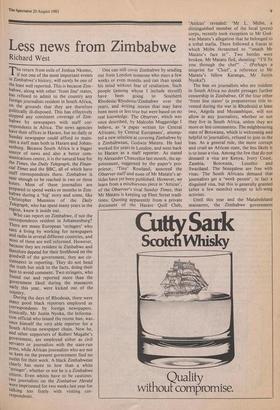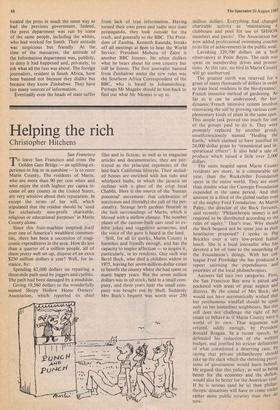Less news from Zimbabwe
Richard West
he return from exile of Joshua Nkomo, if not one of the most important events in Zimbabwe's history, will surely be one of the least well reported. This is because Zim- babwe, along with other 'front line' states, has refused to admit to the country any foreign journalists resident in South Africa, on the grounds that they are therefore Politically ill-disposed. This has effectively stopped any consistent coverage of Zim- babwe by newspapers with staff cor- respondents in Africa. The news agencies have their offices in Harare, but no daily or Sunday newspaper could afford to main- tain a staff man both in Harare and Johan- nesburg. Because South Africa is a bigger source of news and also a better com- munications centre, it is the natural base for
the Times, the Daily Telegraph, the Finan-
cial Times and the BBC, all of which have staff correspondents there. Zimbabwe is near enough to be reached in two or three hours. Most of these journalists are Prepared to spend weeks or months in Zim- babwe during a 'big' story and some, like Christopher Munnion of the Daily Telegraph, who has spent many years in the region, know it inside out.
Who can report on Zimbabwe, if not the correspondents resident in Johannesburg?
There are many European 'stringers' who earn a living by working for newspapers and radio in several different countries, and most of these are well informed. However, because they are resident in Zimbabwe and therefore depend for their livelihood on the goodwill of the government, they are cir- cumspect in reporting. They do not bend the truth but stick to the facts, doing their best to avoid comment. Two stringers, who found out and reported more than the government liked during the massacres early this year, were kicked out of the country. During the days of Rhodesia, there were Many good black reporters employed as
correspondents by foreign newspapers. Ironically, Mr Justin Nyoka, the Informa- tion official who issued the recent ban, was,
once himself the very able reporter for a South African newspaper chain. Now he, and other supporters of Robert Mugabe's government, are employed either as civil servants or journalists with the state-run press, while African journalists who are not so keen on the present government find no outlet for their work. A black Zimbabwean clearly has more to lose than a white stringer', whether or not he is a Zimbabwe citizen. Even whites have to be cautious: two journalists on the Zimbabwe Herald were imprisoned for two weeks last year for talking too freely with visiting cor- respondents. One can still cover Zimbabwe by sending out from London someone who stays a few weeks or even months and can than speak his mind without fear of retaliation. Such people (among whom I include myself) have been going to Southern Rhodesia/Rhodesia/Zimbabwe over the years, and writing stories that may have been more or less true but were based on no real knowledge. The Observer, which was once described, by Malcolm Muggeridge I believe, as 'a paper written for Central Africans, by Central Europeans', attemp- ted a new solution at covering Zimbabwe by a Zimbabwean, Godwin Matatu. He had worked for years in London, and went back to Harare as a staff reporter. As stated by Alexander Chancellor last month, the ap- pointment, suggested by the paper's pro- prietor, 'Tiny' Rowland, annoyed the Observer staff and none of Mr Matatu's ar- ticles have yet been published. However, we learn from a mischievous piece in 'Atticus', of the Observer's rival Sunday Times, that Mr Matatu is keeping up Fleet Street tradi- tions. Quoting apparently from a private document of the Harare Quill Club, `Atticus' revealed: `Mr L. Mtibe, a distinguished member of the local (press) corps, recently took exception to Mr God- win Matatu's allegation that he belonged to a tribal mafia. There followed a fracas in which Mtibe threatened to "smash Mr Matatu's face in". Two bottles were broken. Mr Matatu fled, shouting: "I'll fix you through the chef" .' (Perhaps a misprint for 'Chief', a reference to Mr Matatu's fellow Karanga, Mr Justin Nyoka?) The ban on journalists who are resident in South Africa no doubt presages further censorship in Zimbabwe. Of the four other front line states' (a preposterous title in- vented during the war in Rhodesia) at least two, Angola and Mozambique, will not allow in any journalists, whether or not they live in South Africa, unless they are more or less communists. The neighbouring state of Botswana, which is welcoming and helpful to'journalists, refused to join in the ban. As a general rule, the more corrupt and cruel an African state, the less likely it is to issue a visa. Among the few that do not demand a visa are Kenya, Ivory Coast, Zambia, Botswana, Lesotho and Swaziland. The Senegalese are free with visas. The South Africans demand that journalists get a 'work permit', in fact a disguised visa, but this is generally granted (after a few months) except to left-wing activists.
Until this year and the Matabeleland massacres, the Zimbabwe government
treated the press in much the same way as had the previous government. Indeed, the press department was run by some of the same people, including the whites, who had worked for Smith. Their attitude was suspicious but friendly. At the, time of the massacres, the attitude of the Information department was, publicly, to deny it had happened and, privately, to ask what all the fuss was about. The foreign journalists, resident in South Africa, have been banned not because they dislike but because they know Zimbabwe. They have too many sources of information.
Eventually even the heads of state suffer from lack of true information. Having turned their own press and radio into state propaganda, they look outside for the truth, and generally to the BBC. The Presi- dent of Zambia, Kenneth Kaunda, breaks off all meetings at 6pm to hear the World Service. President Mobutu of Zaire is another BBC listener. He often dislikes what he hears about his own country but still he listens. The first journalist banned from. Zimbabwe under the new rules was the Southern Africa Correspondent of the BBC, who is based in Johannesburg, Perhaps Mr Mugabe should let him back to find out what Mr Nkomo is up to.



































 Previous page
Previous page